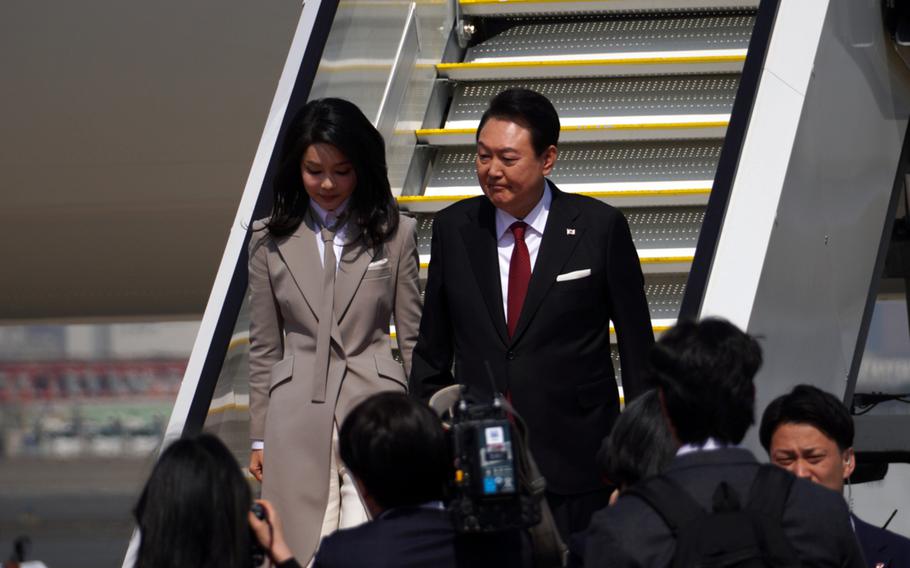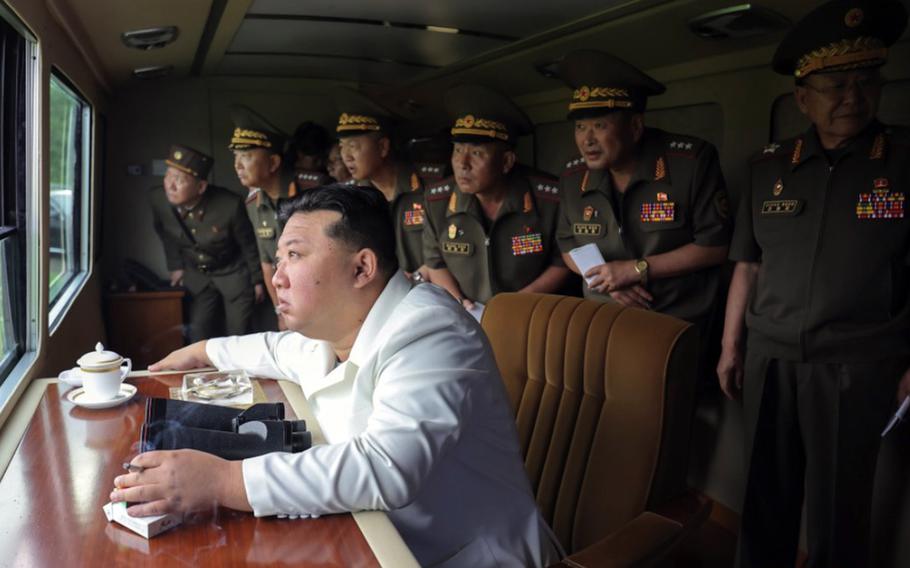
South Korean President Yoon Suk Yeol arrives at Haneda International Airport in Tokyo with his wife, Kim Keon-hee, March 16, 2023. (Akifumi Ishikawa/Stars and Stripes)
Political analysts in South Korea and the United States expressed mixed reactions to former President Yoon Suk Yeol’s ouster on Friday, with some warning of significant policy shifts if an opposition leader assumes power.
The country’s Constitutional Court unanimously upheld Yoon’s impeachment by the National Assembly, formally removing the conservative leader from office. The impeachment stemmed from Yoon’s brief and unsuccessful attempt to impose martial law on Dec. 3.
Yoon, a member of the People Power Party, took office in 2022 with a hardline approach to North Korea. His administration responded to Pyongyang’s threats with displays of military strength, including the first-ever joint air power exercise involving South Korea, the U.S. and Japan in October 2023.
Sung-Yoon Lee, a fellow at the Woodrow Wilson International Center for Scholars in Washington, D.C., said Yoon’s removal “virtually enthrones” Democratic Party leader Lee Jae-myung as the likely next president.
Lee, who has not formally announced a run for the presidency, faced Yoon in the 2022 election. In December, he famously scaled a wall at the National Assembly to block Yoon’s martial law decree. Yoon defended his decision, accusing the Democrats of obstructing legislation and conducting politically motivated investigations of government appointees.
“If Lee Jae-myung or another [Democratic Party] politician takes power, we can anticipate big changes — mostly for the worse for South Korea’s national security and its alliance with the U.S., based on the ignoble record on North Korea policy …,” Sung-Yoon Lee told Stars and Stripes by email Friday.

North Korean leader Kim Jong Un observes weapons testing at an undisclosed location, Aug. 27, 2024, in this image from the state-run Korean Central News Agency. (KCNA)
North Korea’s state-run media, which frequently criticized Yoon, mentioned his ouster in a brief four-sentence report Saturday. He was “immediately removed from presidency” following the court’s unanimous decision, the Korean Central News Agency reported.
North Korea may have seen Yoon as a security threat, but it remains unclear whether leader Kim Jong Un views his ouster as a victory, said Hwang Jihwan, an international relations professor at the University of Seoul.
“Kim and North Korea may welcome Yoon’s impeachment, but North Korea’s foreign policy … has been more influenced by U.S. policy toward it, not the South’s policies recently,” Hwang told Stars and Stripes by phone Monday.
Tensions between the two Koreas worsened under Yoon, after both sides withdrew from key inter-Korean agreements aimed at reducing military tensions. One such agreement, signed in 2018, prohibited military flights and artillery drills near the border.
Yoon suspended the accords in June, citing Pyongyang’s missile tests and the launch of hundreds of trash-filled balloons across the border. North Korea had already severed the agreement seven months earlier.
“I think Kim Jong Un announced the end of inter-Korean relations,” Hwang said. “The main and basic strategy by North Korea is to wait and see because their policy has focused more on the United States.”
Critics of Yoon’s predecessor, Moon Jae-in, have accused him and Democratic lawmakers of appeasing Pyongyang without delivering long-term benefits to Seoul or Washington.
Moon championed direct talks with Kim Jong Un to curb the North’s nuclear weapons program. He participated in three summits with the North Korean leader, including a 2019 meeting with President Donald Trump at the Demilitarized Zone.
That diplomatic push unraveled after Trump and Kim’s summit in Vietnam later that year ended without an agreement.
“Politicians are prone to switching colors on various issues,” Sung-Yoon Lee said. “But Lee Jae-myung and his fellow lawmakers are united and unswerving when it comes to appeasing Kim …”